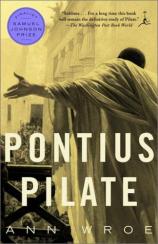Pontius Pilate: The Biography of an Invented Man
Review
Pontius Pilate: The Biography of an Invented Man
Combining exhaustive research with a talent for teasing out the nuances of cross-cultural historical encounters, Ann Wroe has produced an impressive and moving portrait of one of the Bible's pivotal players in PONTIUS PILATE. In Wroe's hands, the life of the Roman governor of Judea who condemned Jesus of Nazareth to death is painstakingly reconstructed from a variety of sources, bringing him to life in a manner beyond his brief, if essential, role in the Gospels.
PONTIUS PILATE is not a biography in the strictest sense of the word. The fragments of information available about the historical Pilate's life are sketchy, and artifacts from his time in Judea paint a suggestive but far from complete picture of his activities, motivations, and goals. As a result, Wroe expanded her research to include the various portrayals of Pilate found in legends and traditions that have developed in the more than 2,000 years since Jesus stood before him. The retelling of these stories allows Wroe to consider Pilate from a number of vantage points and to explore a variety of paths that may have led to his ultimate decision to accede to the Jewish leadership's desire to have Jesus crucified. The result is a multilayered portrait that is all the more compelling for its mythic quality and lack of certitude, allowing the reader to imagine many Pilates faced with one terrible decision.
Wroe's boldest decision, and one of the most impressive accomplishments of the book, was her choice to connect the modern reader to the events in Judea via a number of contemporary re-imaginings of the story. In one example, built around the idea that Judas Iscariot was Pilate's informant for an extended period of time prior to famously betraying Jesus with a kiss, Wroe takes her reader to modern day Cuba, imagining a double agent who spends his days with a revolutionary and his nights reporting to a government official. On another occasion, Wroe explores the dynamics of nonviolent protests at abortion clinics, comparing the protesters' methods with those the Jews employed to protest a decision of Pilate's that they found offensive.
These analogies, which Wroe presents almost tentatively, acknowledging that the correspondence between modern events and those in Judea is never perfect, nevertheless sharpen her portrayal of the circumstances that led to Jesus' trial, conviction, and execution. The decision to include such material was a gamble, but one which pays off for Wroe and her readers.
Another highlight of PONTIUS PILATE is Wroe's careful examination of the words of Jesus and how they must have sounded in Pilate's ears. Taking perhaps Jesus' best known statement from the Gospel of John, "For God so loved the world that he gave his only son, that whoever believes in him shall not perish, but have everlasting life," Wroe considers what a puzzled Pilate might have made of Jesus' words:
"(Jesus) seemed to mean immortality. That was not a foreign concept. There were plenty of immortals; they were set among the stars, engraved on the vault of the sky. Cassiopeia was there, the mother of Andromeda, whose boasting had caused her daughter to be chained to a rock to be eaten by that sea monster that later turned up in Jaffa... Hercules could be seen sprawling, littering the sky with the evidence of his labors in the shapes of lions and dragons; and beyond them, in sparkling drifts, was the milk that had spilled from the breasts of Venus when Cupid had been snatched away."
As the book proceeds to its inevitable conclusion, Wroe considers to what extent Pilate may have been, in her words, "God's secret agent," unable to avoid the role he had to play in God's great design; she discusses the political situation in Judea and throughout the Roman Empire, looking for clues as to whether Pilate could have made any other decision than the one he made; and she considers Pilate as a man, alternately portrayed through the centuries as a sinner and a saint, but finally just a man trying to do his job as he understood it.
Wroe's researching skills alone would have been enough to recommend this book. Her talent for bringing together myth and speculation to create a coherent, if provisional picture, of a man and his times makes PONTIUS PILATE a most impressive work, indeed.
Reviewed by Rob Cline (RJBCline@aol.com) on March 6, 2001
Pontius Pilate: The Biography of an Invented Man
- Publication Date: March 6, 2001
- Genres: Biography, Nonfiction
- Paperback: 432 pages
- Publisher: Modern Library
- ISBN-10: 0375753974
- ISBN-13: 9780375753978





